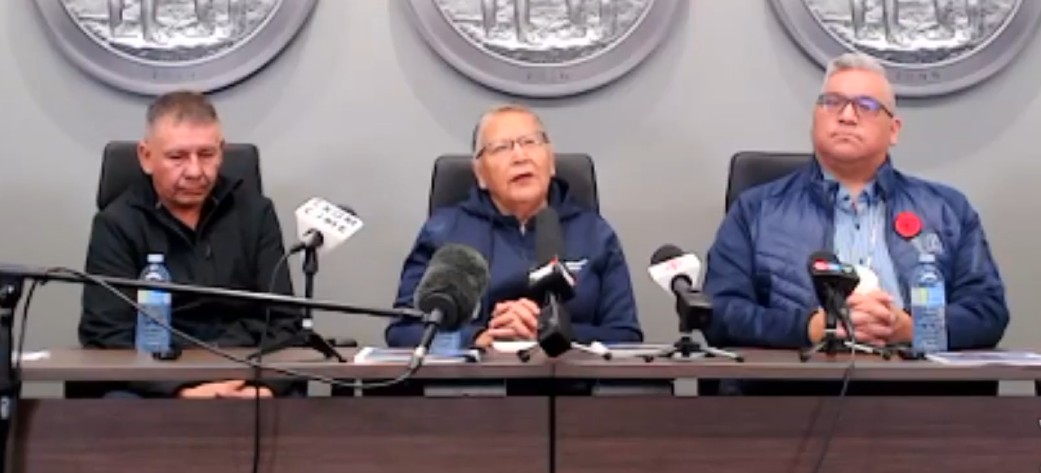Content Warning: The following story contains reports on topics around suicide
The Federation of Sovereign Indigenous Nations has released a report on suicide and self harm in Saskatchewan First Nation communities and is asking for Ottawa to invest in their solution plan.
Released on Monday, the report details statistics around suicide and self-harm on First Nation communities in Saskatchewan stemming form a twenty-year period between 2000-2020. The full report can be found here – Self-Harm Report Final Sept 26 2022FINAL.
The report was done in collaboration between the FSIN and the Saskatchewan Health Quality Council – an independent organization devoted to health research.
The report was initially commissioned in 2016 following a rash of youth suicides on First Nation communities in Saskatchewan. In 2019, Ochapawace Cree Nation and Makwa Sahgaiehcan First Nation would declare states of emergency over suicides in their communities.
Found within the report was “alarmingly” high reported incidents of self-harm and suicide in Indigenous communities. According to the report, Saskatchewan First Nations have the second highest rates of youth self-harm in the country. The report also says First Nations males are three times more likely to commit suicide, and females are six time more likely, compared to non First Nations people in Saskatchewan.
“Life Promotion” solution and call for funding
In addition to the statistical findings, the newly released report also contains what is being described as a “life promotion policy” as a solution to help counteract some of these worrying trends.
The policy includes immediate action, which would be Indigenous-led with a collaborative approach, and would also bring the solutions directly to First Nation communities.
The FSIN is now calling on the federal government to help fund the policy.
At a press conference on Monday Morning, FSIN Vice-Chief David Pratt praised the government for the work they have done so far, especially since 2016, but he says more needs to be done.
“We have a strategy in place that just needs the funding to move forward,” said Pratt. “We are ready to go and we just need the commitment and the investments.”
Pratt pointed to residential schools, mental health issues, and colonial trauma as foundations for the issues, however, he says no individual is to blame.
“It’s not anybody’s fault, it’s not the fault of the current provincial and federal governments,” he said. “But it’s our job to address it, it’s our job to fix it, it’s our job to make those critical investments, and that’s why we are here today to sound the alarm and let everyone know it is time for action.”
Chiefs whose communities declared states of emergency welcome report
At Monday morning’s press conference was Ochapawace Cree Nation Chief Margaret Bear and Makwa Sahgaiehcan First Nation Chief Ron Mistusing whose communities entered states of emergency over suicides in 2019.
During her address Chief Bear recalled meeting with the FSIN back then.
“I was emotional that day and I shed tears because of these suicides,” said Chief Bear.
The Ochapawace chief also spoke on the effects suicide has had on her as she lost her sister to suicide in 1985.
“We never forget a loved one who takes their life through suicide,” she said. “We still hurt to this day.”
Bear believes the federal government has a treaty obligation to help fund the solutions offered within the newly released report.
“A commitment was made and I hope it is honoured and we can work together to create strong healthy communities,” she said. “We now have a report we can utilize to move forward…it’s time for action.”
(PHOTO: From Left to Right – Makwa Sahgaiehcan First Nation Chief Ron Mitsuing, Ochapawace Cree Nation Chief Margaret Bear, and FSIN Vice-Chief David Pratt at a media conference on the release of the report.)
If you or someone you know is in immediate danger of self-harm or experiencing suicidal thoughts, please contact:
Canada Suicide Prevention Service (1-833-456-4566), Saskatoon Crisis Intervention Service (306-933-6200), Prince Albert Mobile Crisis Unit (306-764-1011), Regina Mobile Crisis Services (306-525-5333) or the Hope for Wellness Help Line, which provides culturally competent crisis intervention counselling support for Indigenous peoples at (1-855-242-3310)
